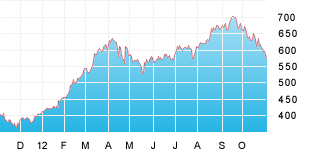%%bloglink%%
I  was channel surfing one night and stopped at ESPN as they were having a debate between two baseball commentators on whether or not a certain baseball team should trade one of their headline players because he hadn’t played very well lately.
was channel surfing one night and stopped at ESPN as they were having a debate between two baseball commentators on whether or not a certain baseball team should trade one of their headline players because he hadn’t played very well lately.
One commentator took the position that the team should keep the player and he laid out facts supporting his claim such as the large number of home runs and hits the player had.
The other commentator took the opposite position and said the team should trade the player and laid out facts supporting his claim such as the very few number of home runs and hits the player had.
What I found interesting from a sports and investing perspective is both commentators were using accurate facts but it was their different starting and ending time periods that made the player (or stock) look either like a hero or a zero.
A good recent example of this is the price of Apple stock (see chart above that shows Apple’s stock price from Oct 2011 to Oct 2012). As a reminder, I am not saying you should or shouldn’t purchase this I am just using it as an example because it is a well known company whose stock prices has recently moved a lot.
- From October 1 2012 to October 26 2012 (one month time frame) the price of Apple stock fell 8.40%
- No one likes to lose money and this stock has just fallen by almost 10%. Not good.
- From April 30 2012 to October 26, 2012 (six month time frame) the price of Apple stock was up 3.43%
- A positive number is always better than a negative but overall very average.
- From January 3 2012 to October 26 2012 (year to date time frame) the price of Apple stock is up 46.88%
- If this was a player these would be cover of Wheaties box type numbers.
Same company but by changing the time periods the results look very different.
Another broader example is:
- You should buy bonds because they have better returns than stocks.
- If you are using the 2008 year results, then this is correct.
- You should buy stocks because they have better returns than bonds.
- If you are using the 2009 year results, then this is correct.
So the next time you see a headline or hear a commentator urging you to buy or sell something because of past returns, stop and consider the timeframes they are using and if you would arrive at the same conclusion if you used different time frames.
